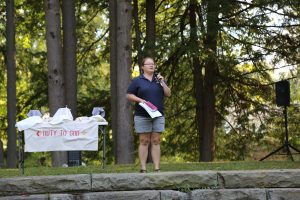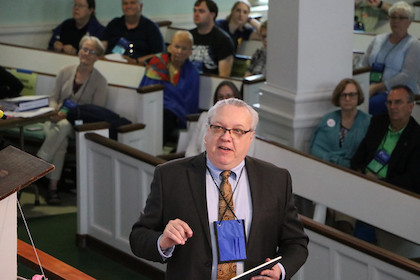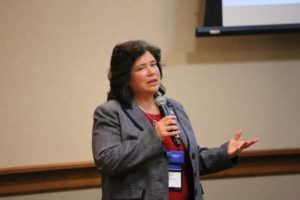As director of Young Disciples and Outdoor Ministries for the West Virginia Conference of the United Methodist Church, Rev. Shea James uses creative ways to challenge students and campers to grow in faith. Sometimes it’s a song. Sometimes it’s a game. And at this year’s Fall Workshop, she’ll be asking youth to complete a spiritual gifts inventory.
They will answer a series of questions to help them determine which of the 20 spiritual gifts — named in the New Testament — God has freely bestowed upon them to help them grow in relationship with God and fulfill their call to discipleship and ministry.

youth worship service.
“Spiritual gifts are God’s generosity poured out,” Shea said. “They are diverse and unique to each believer, and best understood, expressed, and strengthened in Christian community. Spiritual gifts are how we respond to God’s work in our lives, enabling us to be channels of God’s grace towards others.”
Leaders like Shea, whose spiritual gifts are leading, teaching, and shepherding, help others grow, explore, and utilize those gifts for the building up of the body of Christ.
After the youth take their inventories, they will meet virtually in small groups to discuss and explore their gifts, Shea explained, clarifying that the Spiritual Gifts Assessment is merely a good starting point from which a Christian community can help young disciples grow.
A spiritual gifts assessment is only a step toward the development of those gifts, not only for youth but for all Christians at all points in their faith journeys.
“Once you know your spiritual gifts, you should turn to your community (church, family, friends) and share your results,” Shea said. “Ask them: do they see those gifts in you, can they think of examples when they witnessed you using your gifts, and what opportunities are there for you to do more? You cannot fully understand your spiritual gifts outside the Christian community, so find people you trust to process your results.”

2019 Annual Conference
Ken Willard, WVUMC director of Congregational Vitality, agreed.
“One of the best ways I know of to help people discern their own spiritual gifts is through intentional conversation,” said Ken, who has been gifted in leadership, teaching, and faith. “One way to do this is what I refer to as discipleship coaching.
“By asking questions about where they are drawn to in ministry, where they have felt most at home, where they have seen and felt God at work with them, what are they most passionate about, what breaks their heart, where have they served and it did not feel like work, etc. Their responses will usually point out where they have been gifted,” Ken continued. “Another way is to have someone who might be new to the faith to test out some areas in order to best find their fit. Spiritual gifts assessments can be helpful, too. But I have found there is no substitute for a one-on-one conversation.”
It’s important to know and explore spiritual gifts because “we need to honor what we have been given,” Ken said. “We need to grow those gifts, and the Kingdom of God needs us to use our gifts in order to produce a more fruitful harvest.”
But first, these gifts should be discovered, then nurtured.

“We help people to discern their spiritual gifts when we follow one of the commandments that Christ called the most important — to love each other,” said Kim Matthews, CLM, vice president of the United Methodist Foundation of West Virginia and chair of Lay Servant Ministries for the WVUMC. Kim’s spiritual gifts include teaching, serving, administration, and leadership.
“When we listen to each other, we can help others to discern their calls to ministry,” Kim said. “When we encourage each other, we can help others to recognize their own spiritual gifts. Both listening and encouragement are acts of love, and when we help people discern their spiritual gifts, we give them the possibility of another gift: the joy of using that gift in ministry.”
***
If you know a young person who might be interested in participating in a youth centered Small Group focused on exploring and nurturing Spiritual Gifts please share this information with them. Click here for more.
To take your spiritual gift assessment, and to learn more about Spiritual gifts please follow this link.